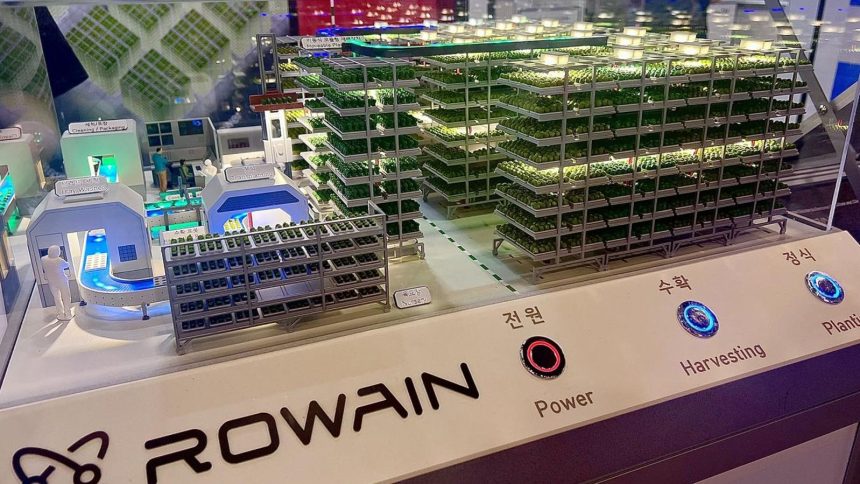The Rise of AI-Powered Agriculture at CES 2025
The agricultural landscape is undergoing a profound transformation, driven by the integration of artificial intelligence (AI) and innovative technologies. This shift was prominently showcased at CES 2025, where nations, particularly South Korea, demonstrated their commitment to attracting younger generations to farming through modernization and efficiency gains. AI’s potential to revolutionize crop cultivation was evident in various exhibits, promising to address challenges like labor shortages, food security, and environmental sustainability.
South Korea’s strong presence at CES highlighted its strategic focus on revitalizing the agricultural sector. Recognizing the declining interest among younger generations in traditional farming, the country is promoting AI-powered vertical farms and robotic automation. These advanced technologies aim to make farming more appealing, accessible, and efficient, especially in urban environments. By automating tasks, optimizing resource utilization, and reducing human error, AI promises to transform agriculture into a more data-driven and technologically advanced industry.
Innovations in Controlled Environment Agriculture:
Several companies showcased groundbreaking solutions in controlled environment agriculture, offering alternatives to traditional farming practices. Airfarm, a two-time CES Innovation Award honoree, presented its inflatable and aeroponic indoor farm. This system enables year-round cultivation by creating controlled climates, independent of external weather conditions. Its water-efficient design and AI-driven environmental controls optimize resource use and crop yields. Another innovative approach was presented by Urban Ponics, which utilizes a "mist ponics" system inspired by rainforest canopies. This semi-controlled environment leverages natural sunlight while precisely controlling nutrient delivery through misting, making it suitable for arid and urban settings.
Rowain, a Korean startup, unveiled its "Intellifarm," an AI-powered vertical farm capable of growing crops from seed to harvest in just 30 days. This automated system minimizes human intervention, addressing labor shortages while attracting younger generations to agriculture. The AI manages nutrient delivery, airflow, and CO2 levels, ensuring optimal growth conditions. By reducing human contact, the system also minimizes the risk of contamination and food recalls, promoting food safety and reducing waste.
Biopesticide Advancements and Drone Technology:
Turkish company Nanomik introduced a novel biopesticide solution utilizing biocapsulation technology. This allows natural oils with pesticidal properties to be effectively applied to crops, offering a sustainable alternative to synthetic pesticides. The biocapsules improve adhesion and absorption by plants, enhancing efficacy and reducing the need for repeated applications. Nanomik’s technology aims to address growing concerns about pesticide regulations and environmental impact, particularly in markets like the US.
Drone technology is also taking flight in agriculture, with Farm Fleet, a Ukrainian company, offering a service connecting farmers with specialized drones for pesticide application. These drones utilize precision spraying techniques, minimizing drift and reducing the negative impacts associated with traditional aerial spraying. Furthermore, the ability to operate at night protects both humans and pollinators from exposure to pesticides. The AI-driven data collection capabilities of these drones allow for targeted application, optimizing pesticide use and reducing waste.
Transforming the Future of Farming:
These innovations highlight the transformative potential of AI and technology in agriculture. By automating tasks, optimizing resource management, and enhancing crop yields, these technologies are paving the way for a more sustainable and efficient food production system. The increasing adoption of controlled environment agriculture, biopesticides, and precision drone technology addresses critical challenges such as labor shortages, climate change, and environmental sustainability. Furthermore, these advancements have the potential to revitalize the agricultural sector, making it more appealing and accessible to younger generations, ensuring the future of food production.
The emphasis on AI-driven solutions reflects a broader trend towards data-driven decision-making in agriculture. By collecting and analyzing vast amounts of data, these technologies provide valuable insights into crop growth, environmental conditions, and resource utilization. This data-driven approach enables farmers to optimize their practices, reduce waste, and enhance productivity. As these technologies continue to evolve and become more affordable, they will play an increasingly important role in shaping the future of agriculture, ensuring food security and environmental sustainability for generations to come.
Moreover, the integration of AI and robotics is transforming the agricultural workforce. While concerns about job displacement exist, these technologies also create new opportunities for skilled workers in areas such as data analysis, robotics maintenance, and system operation. The increasing complexity of these systems requires specialized knowledge and expertise, leading to the development of new career paths within the agricultural sector. This shift towards a more technologically advanced workforce is essential for meeting the growing demands of a global population.
The advancements showcased at CES 2025 demonstrate the rapid pace of innovation in the agricultural sector. These technologies are not mere futuristic concepts, but rather tangible solutions being implemented today to address real-world challenges. The agritech movement is gaining momentum, promising a future where farming is more efficient, sustainable, and resilient. As these technologies become more widely adopted, they will fundamentally reshape the agricultural landscape, transforming how we produce food and ensure global food security.
The focus on sustainable practices is another key theme emerging from these innovations. By optimizing resource utilization, minimizing pesticide use, and reducing waste, these technologies contribute to a more environmentally friendly approach to agriculture. This is particularly important in the context of climate change, as the agricultural sector faces increasing pressure to reduce its environmental footprint. These technologies offer a pathway towards more sustainable food production, mitigating the impact of agriculture on the planet.
Finally, the increasing accessibility of these technologies is democratizing access to advanced farming techniques. Smaller-scale farmers and urban communities can now leverage these innovations to enhance their production capabilities and improve food security in local areas. This empowerment of diverse agricultural stakeholders is a crucial step towards building a more resilient and equitable food system. The future of agriculture is being shaped by these transformative technologies, paving the way for a more sustainable, efficient, and accessible food production system for all.



